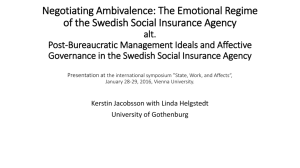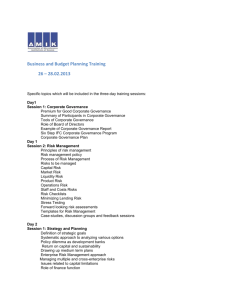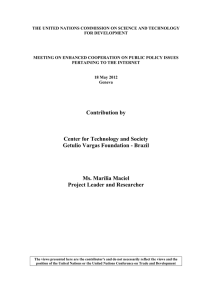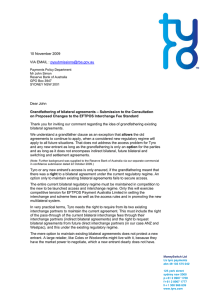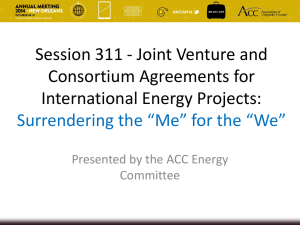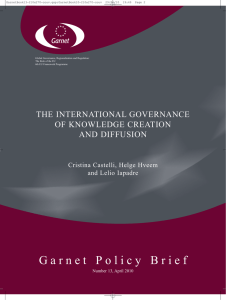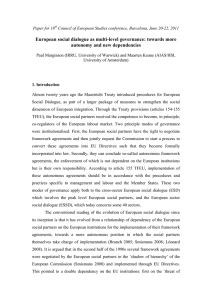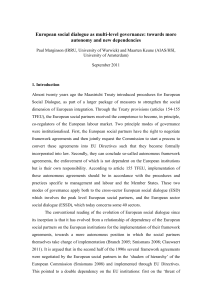Global Economic Environment: Prospects for developing Countries
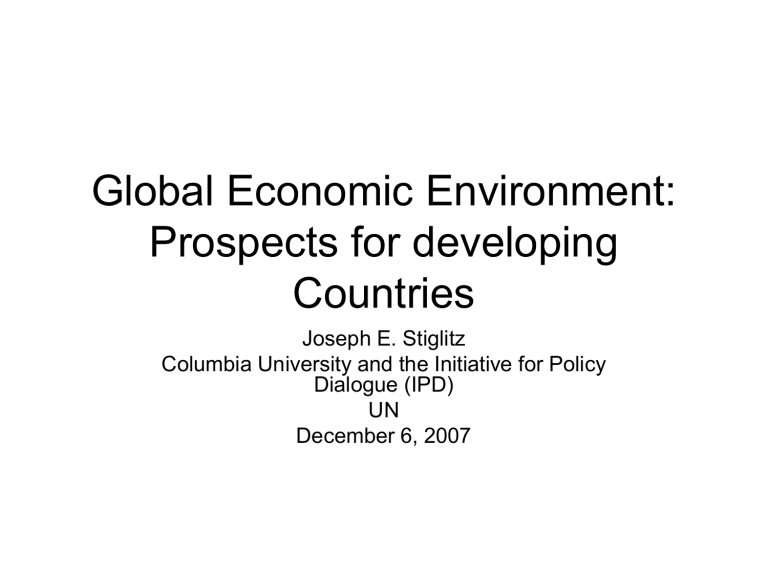
Global Economic Environment:
Prospects for developing
Countries
Joseph E. Stiglitz
Columbia University and the Initiative for Policy
Dialogue (IPD)
UN
December 6, 2007
It is the best of times…it is the worst of times
• Last few years have been good for developing countries as a whole —
• Growth at around 7% near record, and closing gap with developed countries
– African growth for past decade averaged 5.4%
• Even resource poor countries have done well, averaging 4% over past decade
• 6.1% growth for 2007
• Up from 5.7% in 2006
• Five countries with 7% or more growth from 1998-2006
Other regions have also done well
Latin America and the Caribbean
– 5% predicted growth for 2007
– Slightly down from 5.5% in 2006
– But stronger than 4.6% for 2005
– And much stronger than ten year 1995-2004. which averaged a mere 2.6%
East Asia (outside of Japan) remarkable 8.4% in 2007
(some forecasts put 2007 growth at 8.9%)
– Led by China, 11.3%
South Asia around 7.5% 2007
– Led by India, with 8.5% growth
But not everyone is doing well
• Growing inequality within most countries
– Implying reductions in poverty slower than one might have expected
• And some countries not doing very well
– 13 African countries, with 25% of population, grew less than 3% from 1998-2006
– And another 25 countries, with almost 50% of
Africa’s population, grew between 3% and 5%
Developing Countries Facing Major
Challenges in 2008
• Increasing food prices
– Growing global demand
– High energy price, and integration of global energy and food markets, through bio-fuels
– Global warming
– Impending water problems
– Double edged — food producers better off, food importers, urban
2008 worries
• Global financial instability
– Long predicted, as result of global imbalances
• Inadequate American regulation, bad lending practices, misguided macro-economic policies major determinant of global imbalances
• With America borrowing $850 billion in 2006, even if China completely eliminated its 2006 multilateral trade surplus, and even if that translated dollar for dollar into smaller U.S. trade deficit, American trade deficit would have been huge
• Money flowing wrong way —from poor countries to rich
• Long standing worry about a disorderly working out of imbalances
America has exported its problems abroad
• Securitization of bad mortgages plus globalization has meant that problems in
America’s financial system have had global consequences
– Credit squeeze
– Higher risk premium
– Affecting financial markets even in countries that had not bought bad mortgages
Slower growth in 2008
• America’s consumption driven growth not sustainable
– Zero savings rate for last couple of years
– Driven in part by housing bubble
– And financed by “toxic” mortgages
• Often hidden in complex securities
• Lack of transparency
• Bad regulation
• “Game is up”
– Falling housing prices mean households will want to save more
– Drying up of mortgage markets means that even if they wanted to continue consumption binge they can’t
– Result—America is likely to return to more “normal” savings rate
(4 to 6%)
– Speed of return will determine length and duration of slowdown
• This, in turn, will depend in part on adequacy of policy responses
Developing Countries will be hurt
• Important because America is still largest economy in the world
– Developing countries will be hurt by slower growth
– Could lead to weakening commodity prices, undermining growth in commodity price exporters
– Developing countries also hurt by higher risk premiums
Current Problems Come on Top of
Some Longstanding problems
• Unfair trade regime
– Stalled Development Round talks
• Prospects of restarting dimming
• Caused by refusal of U.S. and EU to live up to promises made in Doha
– For some countries, damage from agricultural subsides greater than foreign aid received
• Development round, as currently constituted, does not deserve the name
– Implying that damage to developing countries limited
• There is a broad agenda that could lead to a meaningful development round
– Non-reciprocal agreements needed, like EBA, not EBP
(everything but what you produce)
– Principles of Extended market access
The Real Danger —Bilateral Trade
Agreements
• Undermining the multilateral system
• Even more unfair than bilateral trade agreement
• Not really free trade agreements—they are managed trade agreements, and mostly managed to the disadvantage of developing countries
Intellectual Property
• Should never have been included in Uruguay Round
– But bilateral trade agreements even worse
• Important—Disparities in knowledge even more important than disparity in resources, and TRIPs makes it more difficult to close the gap
• Also makes access to life saving medicines more difficult
– Could have been designed to make access easy
– But intent was just the opposite
– And it succeeded
– Pressure put on countries trying to issue compulsory licenses
– Major potential success in Novartis decision in India in improving access
A Development Oriented
Intellectual Property Regime
• Current regime is bad for global science and for developing countries
– Little investment in research in diseases affecting developing countries
– Intellectual property regime inhibiting innovation
(demands for reform even in U.S.)
• Developing countries demanding a development oriented intellectual property regime
– IP too important to be left to trade ministers, whose agenda is driven by special interests and who have little understanding of key issues of innovation
– Issue of governance
Investment Agreements
• Also should not have been part of trade agreements
• Full consequences for developing countries just becoming apparent
– Suits involving billions of dollars
– Adjudicated in arbitration that does not meet basic standards for judicial procedures
• Often not open and transparent
• Conflicting opinions, no adequate method of resolution
• More than just protection against expropriation
– Could have been protected through insurance
– Impede ability of governments to protect environment, impose other regulations, advance other social objectives
• Must not only be a moratorium on such agreements, but a roll back
– Little evidence that they have significant effect in promoting development
– Some evidence that they have adverse effects
– Undermine democratic processes
Global Warming
• Matter of urgency
• Also matter of global social justice
• Developing countries have much to lose if there is not an agreement
• But only acceptable principle for emission rights is equal per capita emissions (with some adjustment for fact that US and other advanced industrial countries have already used up some of their “share” of global atmosphere
• Alternative—globally agreed up carbon tax
Bali Meeting
• Rainforest initiative—providing developing countries with resources and incentives to maintain their forests
– They have been providing whole world with enormously valuable environmental services without compensation
– Greater in value that the value of the foreign aid they receive
• An agreed upon set of principles
– It is a global problem, that has to be addressed globally
– With every instrument in the tool kit
• Market based incentives
• Rising prices of carbon over time
• Regulations and standards
• Research—with knowledge from that research freely available
– Another example where IPR regime may be an impediment in the advancement of social objectives
– An enforcement mechanism
• Trade sanctions
Aid
• Many developed countries still are a long way from living up to their commitments
– US spends in 10 days of its ongoing wars more than it gives to Africa in a year
• Developing countries have demonstrated that they can spend money well
• Need for aid-for-trade
– Anyone who believes trade is good for growth must believe in aid-fortrade
– Without aid, ability to expand trade limited
• Comprehensive approach
– Corruption important
– But corruption is not the only issue
• Increasing worry about hidden conditionality in IDA aid allocation formula
– Inadequate measures of both need and aid effectiveness
Global Financial System
• High level of instability
• With developing countries still bearing brunt of risk
– Some improvement in lending patterns in recent years
• Failing and inequitable global reserve system
– With developing countries lending US (and other reserve countries) trillions of dollars at low interest rates
– Implicit subsidy to U.S. greater than all of its foreign aid
Global Governance
• Underlying many of these problems is a continuing problem of global governance, especially in the area of global economic governance
– Highlighted by problems at the World Bank
– And the way its leader is chosen
• Not a search for the most qualified person
• But essentially the “pick” of the U.S.
– Questions about judgment expressed at the time
– Worse fears realized
– With governance a central focus of policy discourse, inadequacies in governance in the governance of IMF and World Bank undermine their effectiveness
• Some improvements in global governance, but not enough
– Changes in IMF have little impact on decision making
– New head chosen exactly in same way as past
• In spite of dissatisfaction with recent selections at World
Bank and IMF
– Broader participation, more transparency at WTO
• But still not enough
• Consequences: excessive influence of special interests (financial, MNC’s)
The Role of the UN
• Needs to set international economic agenda
– Balancing interests of developed and developing countries
– Broader perspectives on the role of markets, governments, and civil society
– Broader set of objectives (sustainable, democratic, equitable development)
– Relevant to almost every topic under discussion
